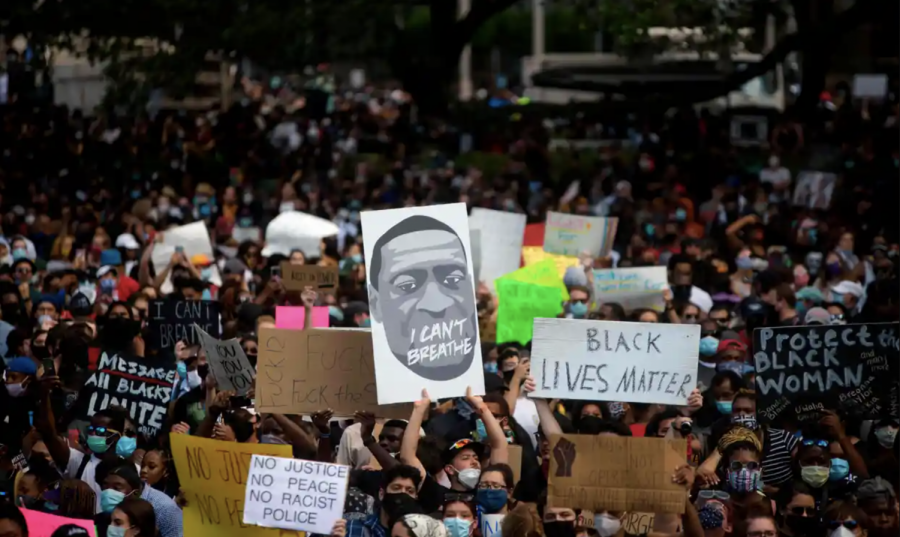One Year After George Floyd
The progress we’ve made and the actions still to come.
June 2, 2021
Tuesday, May 25, marked the one-year anniversary of the death of George Floyd. He was a father, son, and loving partner, and his life was taken far too soon. Floyd’s death sparked a moment of cultural reckoning for many Americans. Finally forced to come face-to-face with the darker side of our country’s law enforcement practices, many saw for the first time the injustices in policing.
On May 25, 2020, former Minneapolis police officer Derek Chauvin knelt on the neck of George Floyd and killed him. Almost one year later, on April 20, 2021, Derek Chauvin was convicted of all three charges he faced: second-degree unintentional murder, third-degree murder and second-degree manslaughter. The death of George Floyd ignited massive protests across the nation and the world. They took place throughout the summer of 2020 and continued into the fall. These protests called for justice for Floyd and other victims of police violence, meaningful criminal justice reform, and change to a system that has victimized Black and brown people and lower-income individuals in this country for far too long.
Floyd’s death was a pivotal moment in our nation’s history. One year later, it is important that, as a nation, we reflect on the chain of events that lead us to where we are today.
For 9 minutes and 29 seconds, Derek Chauvin held George Floyd on the ground as onlookers attempted to intervene and yelled at him to stop. Other officers stood by complicitly and watched a man die as he cried out for his mom. In our country, instances of racial injustice committed by police are sadly not a new phenomenon. Eric Garner was killed by police in New York; Tamir Rice, a 12-year-old, was killed by police in Ohio; and Breonna Taylor was shot in her own home last March, to name only a few. These instances and many others indicate that there is a greater problem than “bad apples” in policing. “Bad apples” did not create a justice system that punishes Black and brown people more harshly than their white counterparts. Although Black people make up only 13 percent of the US population, they make up 38.4 percent of the prison population. According to The Sentencing Project, Black men are incarcerated in state prisons at 5 times the rate of whites. Racial disparities in prisons are a result of many factors, including biased police conduct, higher instances of poverty that make someone more likely to commit a crime, and longer sentences for minor offenses (most often drug-related). Individual police officers did not create policies that enable the disproportionate incarceration of Black people. Rather, it is our tax dollars, government policies, and lawmakers that continue to support a structure that does not protect a significant part of this country’s population.
The verdict in April came as somewhat of a surprise to many of the people following the trial. According to The New York Times, many New Yorkers dampened their expectations of the verdict, not knowing if Chauvin would face conviction. There has been a long history in this country of officers being acquitted of charges of misconduct. Law enforcement officers kill about 1,000 people a year; since 2005, only 121 police officers have been charged with murder or manslaughter for an on-duty killing. Of those 121 cases, only 44 ended up being convicted. Often those convictions are reduced to lesser charges. Derek Chauvin’s conviction might be an anomaly, but it provides hope that our justice system is not beyond repair. It is possible to create a law enforcement and justice system that guarantees equal due process to all its citizens.
But decisive action needs to be taken when people’s lives hang in the balance. Government plays a necessary role in solidifying progress in legislation. In February of 2021, the House of Representatives passed The George Floyd Justice in Policing Act of 2021. According to a summary on the official Congress website, “[The] bill addresses a wide range of policies and issues regarding policing practices and law enforcement accountability. It increases accountability for law enforcement misconduct, restricts the use of certain policing practices, enhances transparency and data collection, and establishes best practices and training requirements.” The act would lower the criminal standard to prosecute law enforcement and would limit qualified immunity in civil lawsuits. These changes would make it easier for families to get justice for their loved ones. If this act passes the Senate, we will be one step closer to meaningful systemic change in our justice system that protects the rights of everyone living in the United States.
In this past year, I have witnessed progress amongst my peers at SLS and in my greater community. The way kids talk has shifted because they are more aware of the consequences of what they say. In addition, classes like American Studies that have been added to the SLS curriculum have provided a more nuanced understanding of United States history. As St. Luke’s and the rest of the county move forward, it is necessary to continue to examine what we are learning, to raise awareness regarding issues of social justice, and to work together to ensure that we are actively protecting the rights and safety of all our fellow citizens.



